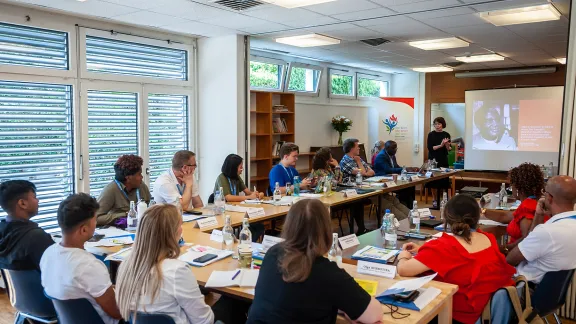Lay leaders from churches around the globe reflect on ways they have been enriched by a seminar in Geneva and Wittenberg focused on capacity building and leadership development

LWF Secretary General Rev. Dr Anne Burghardt addresses the lay leaders’ seminar in Geneva. Photo: LWF/S. Gallay
Meeting in Geneva and Wittenberg brings together lay leaders from 17 member churches
(LWI) - Affirming the vital role of lay leaders in the Lutheran church, from the Reformation until the present day. That was the goal of a week-long seminar, organized by the Lutheran World Federation (LWF) in Geneva and Wittenberg, which brought together 17 lay leaders from different member churches around the globe.
The 6th International Seminar for Lay Leaders opened on 18 June at the LWF Communion Office in Geneva and concluded on 27 June at the LWF Center in Wittenberg, Germany. Focused on exploring the theological and biblical values of church leadership, it offered participants a unique opportunity to connect and learn from other lay leaders working in very different contexts on different continents.
Rev. Katariina Kiilunen, LWF program executive for capacity building and leadership development, coordinated the seminar and underlined the importance of empowering and inspiring lay leaders, as well as those serving in ordained ministries. “On the first day of our seminar,” she noted, “the scripture was about Jesus calling his first disciples and, as we know, these people were not ordained. Our objective is to acknowledge the vital role that these lay women and men play and to further equip them to carry out their ministries,” she said.
Connecting, enriching, empowering
Participants learnt about the work of LWF and explored what it means to be part of a global communion of churches. “I am very impressed by all the work that LWF is doing around the world and the support it offers to member churches,” said Mirza Munoz Orea from the Lutheran Church of Mexico. “As a minority in my country, I frequently feel alone and there are not so many people who share my faith. But now I have met friends who believe the same as me and it is so comforting to know that.”
Rama Ramanathan from Malaysia is a lay leader and former Council member of the Bangsar Lutheran Church in Kuala Lumpur, where he runs a blog and preaches once a month. He was “enriched” by his experience at the seminar, firstly by discovering the “spread and depth of activities of the LWF, including its long, good and growing relationship with the UN, as well as the extent of theological reflection on contemporary issues such as hunger, the refugee crisis and inclusivity.”
Secondly, Rama said, he was “struck by the idea of prophetic diakonia, of going beyond acts of mercy to question why such acts are necessary and who needs to do what to change this.” Thirdly, he continued, “I was drawn to ponder the role played by conflicts within and between churches in shaping Christian doctrine and fourthly, I have a fresh sense of the important role played by lay people such as Katarina von Bora, Philip Melanchthon or Lukas Cranach, in the early days of the Reformation.”
Through baptism, all are called to serve the church in different capacities
Rev. Katariina Kiilunen, LWF program executive for capacity building and leadership development
Joren Reichel is a member of the Lutheran synod within the Protestant Church in the Netherlands. He is also part of the LWF’s Global Young Reformers Network and a youth delegate to the Krakow Assembly. He said it was “very inspiring for me to hear the real stories and to find out more about the impact that LWF has in countries around the world.” In particular, Reichel said he “learned a lot about broadening the sense of being part of a world communion of churches, which is something that we, as Lutherans, are trying to put on the map within our own Dutch context.”
Rev. Kiilunen noted that some seminar participants had “little previous knowledge of LWF’s work so felt empowered and energized by their encounters with colleagues at the Communion Office.” Many were unaware of the wealth of resources on historical topics or current affairs that are available to support them in their ministries. “Reflecting on the theme of shared and servant leadership,” she said, “we emphasized that through baptism, all are called to serve the church in different capacities and everyone has something to contribute in building up the Body of Christ.”


